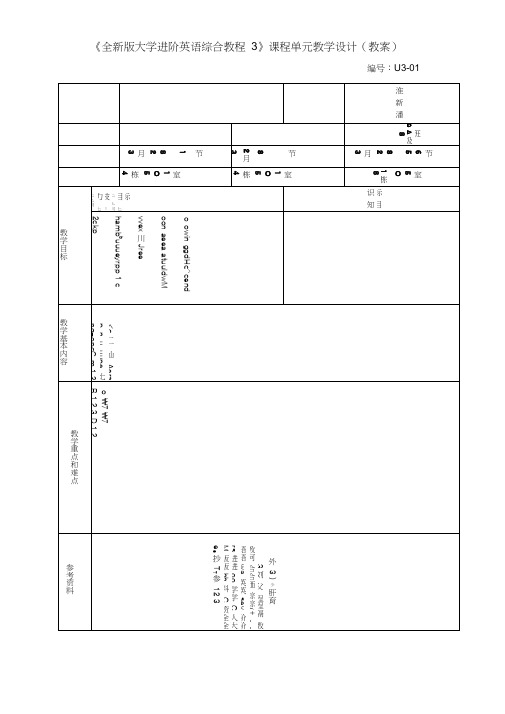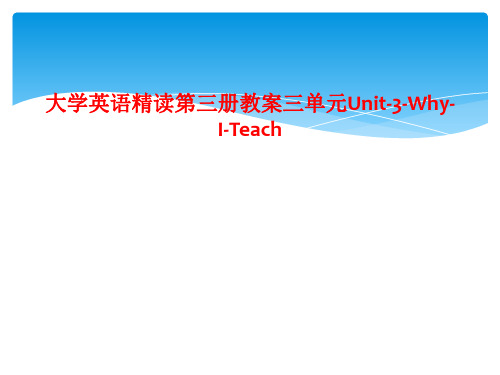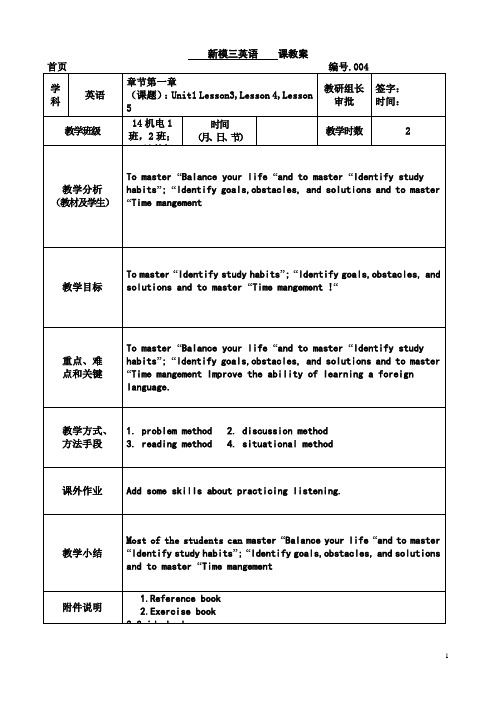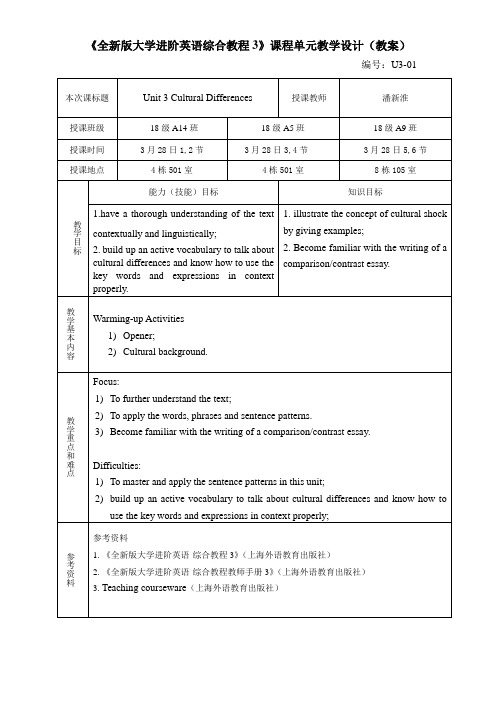新模式英三教案Unit-3资料
新模式英三教案Unit-3资料

教师活动内容
学生活动内容
时间
Organization
Check all the students and be prepared for the class.
Lesson1
House hunting
Step 1Ask students tothink about the place where they live. How did they find it? What are some different ways to find housing?
avail: availablebalc: balcony
bdrm: bedroomctr: center
fl: floorfrig: refrigerator
gar: garagel/r: living room
lge, lrg: largeMo.: month
Step4Here are more ways to make comparisons. Study the charts on page 42, and then finish exercise F,G..
Listen to the teacher.
Learn the uses of useful words and phrases and makeexamples.
Listenand takenotes.
Work in pairs.
2′
15′
15′
15′
教与学互动设计
教师活动内容
学生活动内容
时间
Step3Study chart with your classmates and teachers.Thenpracticeasking and answering yes/no questions with a partner, using the Nguyen family’s preferences on page 44.
新模式英语 unit3 food lesson 3 What do we need

Other containers:
1 pack:(纸制的)小盒
例如: a pack of cigarettes/gum 一盒香烟/口香糖
2 drum:桶 例如: a drum of oil/petrol 一桶油/汽油 3 carton:硬纸盒 例如: a carton of milk/yogurt 一盒牛奶/酸奶
B
Answer the questions. Bubble in True or False.
1. Duong buys his lunch at school. (
Χ 2. Duong and his son go to the store every Saturday. ( Χ ) 3. Duong and his wife buy bread and meat for sandwiches. ( √ )
SHOPPING LIST
√ _______ tuna fish √ _______ peanut butter √ _______ jelly _______ turkey √ _______ chicken
_______ salad
_______ ham
D
bag
Study the words for food containers. Write the correct word under each picture.
E
What other foods go into each container?
(Answers will vary. Sample answers are given.)
Container can / cans bottle / bottles package / packages box / boxes jar / jars bag / bags Food beans, coffee soda, juice meat, candy crackers, cereal peanut butter, jelly
《全新版大学进阶英语综合教程3》Unit3教案(20200701094738)

《全新版大学进阶英语综合教程3》课程单元教学设计(教案)编号:U3-01Opener:Pair work: The pictures below compare Westerners (marked in blue) and Chinese (marked in pink) in their way of looking at children and the family, travelling, and the role of the boss in an organization. Look at the pictures an work with your part ner to an swer the questio ns that follow.Helpful Expressi ons接送孩子 drop off and pick up the child 风土人情 local customs and culture 至吐匕一游 been here, done that 高高在上 superiority 有权有势 powerfulQuestio ns:1 In what way does the role of grandparents in Chinese families differ from that in Western families?2 In what way do Western tourists and Chin ese tourists behave differe ntly?3 In what way do Western and Chinese employees differ in the way they look upon their boss?Tips in this part:1. In troduce the topic to the class by ask ing if they can give any example of how Chinese and non-Chinese behave or think differently in life.2. Explai n the pictures in Opener that illustrate the differe nces betwee n the Westerners and Chin ese in their perspective on differe nt issues.3. Ask Ss to look at the pictures and discuss the differences in pairs with the aid of the questi ons that follow.4. To sum up, have differe nt pairs report to the class their discussi on on the pictures, one pair for one picture.Video watchi ng:After watch ing a video clip about an in terview with three foreig n wome n marrying Chinese husbands, discuss the following questions with yourSteps(步骤)教学组织1.whe n what is the differe nee Trave^llfiMg■SiStep One(步骤一)Step Two(步骤二)part ner.《全新版大学进阶英语综合教程3》课程单元教学设计(教案)编号:Comprehe nsion check1. Text Orga ni zati onPair work: This text is organized around the cultural shock the authorexperieneed after the birth of her daughter and her mother-in-law ' fulltime presenee in her family. It can roughly be divided into six parts. Now complete the follow ing table by writ ing dow n the main idea of each part. The first one has been done for you. When you finish, compare notes with your partner.Steps(步骤)教学组织Step One (步骤一)2 Comprehe nsion Check Pair work: With the teacher as guide, you and your partner work on the follow ing comprehe nsion check exercises. 2.1 Diggi ng into detailAn swer the follow ing questi ons to better un dersta nd the text. You may wantto write dow n some key words in the space provided before you do so. (Para. 6) 1 What made the author so mad about her husba nd that they bega n to fight over childcare duties?The fact that he wasn ' t tak ing on half of the childcare duties, and he thought it was more important to spend time on his work than on his daughter, and his expectation that his mother would do all the housework he was supposed to do.(Para. 8) 2 How did her mother-i n-law explai n her role in the family?Her mother-in-law explained that her role in the family was to lighten the burde n of her son, allow ing him to keep his former way of life, and to help her daughter- in-law out with pare nti ng and household man ageme nt.(Para. 9) 3 What did the author think of her mother-in-aw ' s explanation?She thought it was absolutely un acceptable, because, in her view, her husband is one of two parents, and therefore their daughter should be half his responsibility; and she married her husband, not her mother-in-law.(Para. 13) 4 How come her husband, unlike the author, failed to adopt daily habits around the schedule of their daughter?He obviously believed that mothers are the primary caregiver of childre n and this was the no rmal differe nee betwee n mothers and fathers.(Para. 16) 5 How did the author react whe n she was told that, now that her mother-in-law helped her out by taking care of her daughter, it was her resp on sibility to take care of her mother-i n-law whe n she was old?She totally rejected the idea, because she thought what her mother-in-law did was fulfillingthe parenting responsibility of her husband, therefore it was her husband ' s responsibility to take care of his own mother when she was old. 2.2 Un dersta nding difficult senten cesTips in this part :1. Before moving onto the author ' s explou n ttp Ss the text can rough divided into six parts.2. Guide Ss to explore the text by asking them to work on the table in Orga ni zati on and do the task in Digg ing into detail.3. Ask Ss to sum up the differences of views between the author and her mother- in-law on matters described in the text.4. Check Ss' understanding by guiding them through the tasks in Un dersta nding difficult senten ces. Text An alysisThe author ' r eflections on childcare are skilfully framed between the con versati ons with other wives that ope n and close the text. The ope ning sets the scene and introduces her husband and herself. Next comes her mother-in-law, whose strong senseof duty is expressed in a shift to short, emphatic senten ces:“ Her role isclear. She has to be here. ”What follows is part factual account, part persuasive argument. The author does not simply give a neutral description of the differences between her husba nd and herself. She clearly wishes to persuade us that she is right and he is wrong. As a con seque nceher writ ing contains much in com mon with other pieces of persuasive writing. There are therhetorical questions : “lam expected …but he is relieved of his fatherly duties …?” “ Why does he getout of the datasks …?T here is the emotive Ianguage. She is "incensed a f what she sees as hisStep Two(步骤二)“ laz in ess ” ; he “ was n' t honouring ” his role as a father.Towards the end she admits that he has made an effort to compromise, though eve n here she is quick to add “ in resp onse to my growli ngwith the impression of an uneasy truce rather than a meeting of minds.Step Three (步骤三)II. Lan guage FocusWords and expressi ons1. negotiation: n.磋商;谈判e.g. The 6-month negotiations between the two countries ended fruitlessly. 两国谈判半年一无所获。
新模式英语 3 unit3

LESSON
Work with a partner to list the abbreviations in the ads. What does each abbreviation stand
C for? Discuss their meanings with your teacher.
I
LESSON
Think about the place where you live. How did you find it? What are some different ways to
A find housing?
One way to find housing is through classified ads in the newspaper. Read the ads below.
LESSON
Glossary
ctr (center) n.中心;中央 fl ( floor) n.( 楼房的)层 frig (refrigerator)n. (电)冰箱 fwys (freeways) n.( 高速)公路 gar (garage) n. 车库;汽车修理厂 gated a. 用门控制的 guard n. 警卫;警戒;看守 hookup n. 连接;转播;接线图 housing n. 〔集合词〕房屋;住宅 hunt vt. 搜索,寻找,追获 l/r (living room) n. 起居室 lge, lrg (large) a. 大的,巨大的 Mo. ( month) n. 月 nbhd (neighborhood) n. 居民小区
LESSON
G
Complete the sentences with the correct word: fewer, less, fewest, or least.
大学英语精读第三册教案三单元Unit-3-Why-I-Teach

Unit 3 Why I Teach
1. Warm-up questions
1) Would you like to be a teacher? Why orБайду номын сангаасwhy not?
2) 2) What are the advantages of being a teacher, what are the disadvantages?
notes
MonywghiraltfrIiesanydinccolmassp!elled
me
to
me
Whhye, trhmeno, tdhoeIr.teach?
reflection: n.
Chinese
12..映 反I映像t,e倒 3a.c深影h思b;ec考a虑us;e I like the pace of the
I hope this will convince you to change your mind.
The lawyer tried to convince the jury陪审团 of his client’s当事人 innocence.
Chinese
compel vt. 强迫, 使不得不
Nor do I teach because I think I know
Chinese
leave out 遗漏, 省略, 删去; 未顾及, 忽略
I’vSaenodmteacahcdahelilneagnglgiesi,vteaosnfdmneathmpeaecoesp, p—aonrdtIuhvnaoitrpyieettyo,
I hkaevepeno’tnleleftaranninygone out.
新模式英语三教案Unit1 Lesson3,Lesson 4,Lesson 5

1.Reference book
2.Exercise book
3.Guide book
教
学流Leabharlann 程时间环节
内容
意图要求
对策方法
10’
15’
15’
Explaination
Explaination
Explaination
1.Lesson 3.Identify goals,obstacles, and solutions
◆sometimes意为“有时”,频率不及often,表示动作偶尔发生,间断时间较长。其位置比较灵活,放在句首、句中、句末都可。如:
Sometimes we go to the cinema and at other times we go for a walk.
有时我们去看电影,有时我们去散步。
I sometimes watch TV in the evening.我有时晚上看电视。
Debbie is sometimes not responsible for what she does.黛比有时对她所做的事不负责任。
位于句末的用法
1.sometimes常可用于句末。如:
We all get into trouble sometimes.我们有时都会遇到麻烦。
You can’t work all the time,it does you good to go out and enjoy yourself sometimes.
2.The use of the these adverbs of frequency.
3. Lesson 4.Identify study habits
4.Lesson 5 . Time mangement
《全新版大学进阶英语综合教程3》Unit 3教案

《全新版大学进阶英语综合教程3》课程单元教学设计(教案)编号:U3-01Steps(步骤)教学组织Step One (步骤一)Opener:Pair work: The pictures below compare Westerners (marked in blue) and Chinese (marked in pink) in their way of looking at children and the family, travelling, and the role of the boss in an organization. Look at the pictures and work with your partner to answer the questions that follow.Helpful Expressions接送孩子drop off and pick up the child风土人情local customs and culture到此一游been here, done that高高在上superiority有权有势powerfulQuestions:1 In what way does the role of grandparents in Chinese families differ from that in Western families?2 In what way do Western tourists and Chinese tourists behave differently?3 In what way do Western and Chinese employees differ in the way they look upon their boss?Tips in this part:1. Introduce the topic to the class by asking if they can give any example of how Chinese and non-Chinese behave or think differently in life.2. Explain the pictures in Opener that illustrate the differences between the Westerners and Chinese in their perspective on different issues.3. Ask Ss to look at the pictures and discuss the differences in pairs with the aid of the questions that follow.4. To sum up, have different pairs report to the class their discussion on the pictures, one pair for one picture.Step Two (步骤二)Video watching:After watching a video clip about an interview with three foreign women marrying Chinese husbands, discuss the following questions with your partner.1. According to the video, when raising grandchildren, what is the difference《全新版大学进阶英语综合教程3》课程单元教学设计(教案)编号:U3-02《全新版大学进阶英语综合教程3》课程单元教学设计(教案)编号:U3-03《新视野大学英语(第三版)》Book 3课程单元教学设计(教案)编号:U3-04DiscussionDiscuss what you like / dislike about where you live.things you like:a food market; a bookstore; close to the metro; a good hospital / medical care centerthings that are nice but not essentiala good local supermarket; a sports center;a theater / cinema; a barthings you dislike:lacking of parking space; various types of noise; pollution; high crime rateThink about your neighborhood. What would make it:safer?Lectures should be given to tell people how to prevent fire, theft and other dangers. Besides, the police should make sure the streets are safe –not only from crime but also from traffic accidents.more beautiful?I think we should plant more trees and flowers in the community. In addition, we should discipline our own behavior and should not litter garbage everywhere or draw on the buildings.more interesting?More entertainment activities should be held to draw the interest of people. Meanwhile, don’t forget the children. We should also provide them with facilities to give them fun and joy.better for your health?I think we should build a community gym providing a variety of affordable exercise options. Besides, activities should be conducted to help people quit smoking or excessive drinking.more of a community?I’d really like to see a good shopping mall, where people can meet, get to know each other and entertain themselves.。
电子课件-《新模式英语(3)》-B10-7342 book 3-unit3

LESSON
Glossary
Phrases & Useful Expressions count noun 可数名词 sec dep ( security deposit) 财产保证押金
Proper Names Brad 布拉德 Jen 耶恩 Pablo 巴勃罗 Phuong 凤 Rachel 雷切尔 Worshams 沃山姆斯
LESSON
Work with a partner. Scan the ads above and ask and answer the questions below. Try to
H answer in complete sentences.
LESSON
Work with a partner. Scan the ads above and ask and answer the questions below. Try to
I
LESSON
Think about the place where you live. How did you find it? What are some different ways to
A find housing?
One way to find housing is through classified ads in the newspaper. Read the ads below.
LESSON
Glossary
noncount n. 不可计算数(目) nr (near) prep. 接近,邻接 patio n. 天井,院子 pet n. 宠物 pool n. 游泳池 scan vt. 浏览 security n. 安全,保护,保卫 spa n. 水疗浴池 spacious a. 广阔的,宽敞的 stove n. 炉子 studio n. 工作室,画室,演播室 trash n. 废料,垃圾 w/ (with) prep. 带,具有 W/D (washer/dryer) n. 洗衣机/干k. Search for classified ads for housing on the Internet. What abbreviations can you find?
新模式英语三教案Unit3 Lesson1,Lesson 2

另外,引导条件状语从句的连接词(connector)还可以是unless, so long as, in case, on condition that, supposing that, provided that等。
if引导条件状语从句的两种用法:
倘若下雨,我们的运动会还要继续举行吗?
Supposing something should go wrong, what would you do then?
假如出了什么问题,你准备怎么对付?
Listen to the teacher and take notes.
Remember some important terms.
例如:
If the snow has completely stopped, we will be playing with snow on the playground.
如果雪能够完全停下来,我们将正在操场上玩雪呢!
If it is snowing, we will have been walking in the snow for more than two hours.
2.but for, without等引出一个介词结构来表示条件,条件常常是虚拟的,或与事实相反的假设。如:
but for若非,要不是
But for the rain, we should have a pleasant journey.
要不是下雨,我们的旅行肯定会很愉快。
But for your help,we should not have finished in time.
Explaination and practice.
新课改人教版高中英语选修三unit3单元课时教学设计完整

新课改人教版高中英语选修三unit3单元课时教学设计完整The new curriculum reform in China has brought about significant changes to the education system, particularly in the teaching of high school English. One of the key aspects of this reform is the implementation of the People's Education Edition (PEE) textbooks, which include the Elective Three Unit 3 unit. This unit presents a unique opportunity for teachers to design and implement engaging and effective lesson plans that cater to the diverse needs of their students.The overarching goal of the Elective Three Unit 3 unit is to equip students with the necessary skills and knowledge to effectively communicate in English in various social and academic contexts. This unit covers a wide range of topics, including interpersonal communication, cultural awareness, and critical thinking. By the end of the unit, students should be able to demonstrate proficiency in these areas, as well as a deeper understanding of the nuances of the English language.One of the key challenges in designing a comprehensive teaching plan for this unit is the need to balance the coverage of the required content with the need to engage and motivate students. To address this, teachers should adopt a student-centered approach that emphasizes active learning and encourages students to take an active role in their own learning process.One effective strategy for achieving this is the use of a variety of teaching methods and techniques. For example, teachers can incorporate group discussions, role-playing activities, and multimedia presentations to keep students engaged and interested. Additionally, the use of authentic materials, such as news articles, videos, and podcasts, can help students develop a deeper understanding of the real-world applications of the concepts they are learning.Another important aspect of the teaching design is the need to differentiate instruction to cater to the diverse learning needs of students. This may involve providing additional support or challenge for students with different levels of proficiency, as well as incorporating strategies to accommodate different learning styles and preferences.One way to achieve this is through the use of a flipped classroommodel, where students are asked to engage with the course content outside of class, and class time is used for active learning activities and discussions. This approach allows teachers to provide more personalized support and feedback to students during class time, while also encouraging students to take a more active role in their own learning.In addition to the teaching strategies and techniques, the design of the unit should also take into account the assessment of student learning. This may involve a combination of formative and summative assessments, such as quizzes, presentations, and project-based assignments. By using a variety of assessment methods, teachers can gain a more comprehensive understanding of student progress and identify areas where additional support or intervention may be needed.One particularly effective assessment strategy for the Elective Three Unit 3 unit is the use of performance-based assessments, where students are asked to demonstrate their language skills in real-world scenarios. This can involve tasks such as conducting a job interview, participating in a group discussion, or delivering a persuasive speech. By using these types of assessments, teachers can not only evaluate student learning but also provide valuable feedback and guidance to help students improve their communication skills.Overall, the design of a comprehensive teaching plan for the Elective Three Unit 3 unit requires a careful consideration of a variety of factors, including the learning objectives, teaching strategies, assessment methods, and the diverse needs of students. By adopting a student-centered approach and incorporating a range of effective teaching and assessment techniques, teachers can help students develop the necessary skills and knowledge to succeed in their English language learning journey.。
新模式英语三教案Unit2 Lesson3Lesson 4Lesson5

首页编号.006
学科
英语
章节第一章
(课题):Unit2 Lesson3,Lesson 4,Lesson5
教研组长审批
签字:
时间:
教学班级
14机电1班,2班;14计算机班,14商务1班班,
时间
(月、日、节)
教学时数
2
教学分析
(教材及学生)
To master“Making comparisons”;To master“Cash or charge ?”and
His support furthered my career.他的支持促进了我的事业。
3.elder, eldest & older, oldest的用法区别
(1)old通常的比较级和最高级分别是older, oldest。可用于人或物,可用作表语或定语,可与than连用:
He is older than me.他比我年纪大。
(3)若原级为重读闭音节结尾,且末尾只有一个辅音字母,则双写这个辅音字母后加词尾-er和-est构成比较级和最高级:big—bigger—biggest。
2.通过在其前加more和most构成。多音节和部分双音节形容词通过在其前加more和most构成比较级和最高级:
原级比较级最高级
difficult(困难的)more difficult most difficult
2.Exercise book
3.Guide book
教
学
流
程
时间
环节
内容
意图要求
对策方法
10’
15’
15’
Explaination
Explaination
新模式英语三教案Unit3 Lesson3Lesson 4Lesson5

2、过去进行时还可和when结构遥相呼应,含有意外之意。
5.正当他们扫地的时候,老师进来了。 While they ______ came in.
四、用所给词的适当形式填空
1. While we _______ (wait) for the bus, a girl ______ (run) up to us. 2. I _______ (telephone) a friend when Bob ________ (come) in.
3. 以重读闭音节结尾且末尾只有一个辅音字母的动词,双写该辅音字母后再加-ing 如:begin-beginning swim-swimming sit-sitting
4. 少数几个以ie结尾的动词,要变ie为y,再加-ing 如:tie-tying die-dying lie-lying
五、过去进行时特殊用法
2.当你回来时,他在看电视吗? ________ he ________TV when you came back?
3.昨天中午他在哪里等你? _____________ he _______for you at noon yesterday?
4.当我离开时,他正在做家庭作业。 He _____ _____ his homework when I left.
2. Kate was reviewing her lessons at eight last night.(改为一般疑问句,并做肯、否定回答)
- 1、下载文档前请自行甄别文档内容的完整性,平台不提供额外的编辑、内容补充、找答案等附加服务。
- 2、"仅部分预览"的文档,不可在线预览部分如存在完整性等问题,可反馈申请退款(可完整预览的文档不适用该条件!)。
- 3、如文档侵犯您的权益,请联系客服反馈,我们会尽快为您处理(人工客服工作时间:9:00-18:30)。
Listento the summary .
15′
15′
15′
3′
教 案
章节
课题
Unit3Lesson2
课型
New Lesson
课时
2
教具学具
电教设施
recorder, tape
教学目标
知识
教学点
Make decisions about housing.
能力
新模式英三教案Unit-3
教 案
章节
课题
Unit3Lesson1
课型
New Lesson
课时
2
教具学具
电教设施
recorder, tape
教学目标
知识
教学点
Interpret classified advertisements.
能力
培养点
Learnsome expressions abouthouse hunting.
德育
渗透点
Improvethe ability oflearning a foreign language.
教学重点
难点
重点
Practice listeningand Sentence patterns.
难点
How to improve students’listening skills.
学法引导
1. problem method 2. discussion method
2.carpeting地毯
3.ceiling天花板
4.charming可爱多
5.classify把……分类
6.condo高级公寓
7.count计数,计算
8.guard警卫
9.housing房屋,住宅
10.noncount不可计算数的
Step 3Work with a partner to list the abbreviations in the ads. What does each abbreviation stand for? Discuss their meaning with your teacher.
2.Which place has the most bedrooms?
3.Which place has the highest rent?
4.Which place has more bedrooms, the condo or the apartment?
5.Which place has the lowest security deposit?
Homework
1.Review what we have learned this class and grasp the uses of important words and phrases.
2.PreviewLesson2.
Listen andread.
Learnand write,and correct the answers.
Step5Work with a partner.Scan the ads above and ask and answer the questions below. Try to answer in complete sentences.
1.Which place has more bathrooms, the house or the condo?
教与学互动设计
教师活动内容
学生活动内容
时间
Organization
Check all the students and be prepared for the class.
Lesson1
House hunting
Step 1Ask students tothink about the place where they live. How did they find it? What are some different waStudents can improve their listening ability and speaking ability .
德育
渗透点
Improvethe ability oflearning a foreign language.
教学重点
难点
重点
Practice listeningand Sentence patterns.
Step2One way to find housing is through classified ads in the newspaper. Read the ads below. Which apartment do you like best?
Notes:
1.air-conditioning空调
Listen to the teacher.
Learn the uses of useful words and phrases and makeexamples.
Listenandtakenotes.
Work in pairs.
2′
15′
10′
15′
教与学互动设计
教师活动内容
学生活动内容
时间
appl: applianceapt: apartment
avail: availablebalc: balcony
bdrm: bedroomctr: center
fl: floorfrig: refrigerator
gar: garagel/r: living room
lge, lrg: largeMo.: month
Step4Here are more ways to make comparisons. Study the charts on page 42, and then finish exercise F,G..
3. reading method4. situational method
教学内容
更新、补
充、删节
Add some skills about practicing listening.
参考资料
1.Reference book
2.Exercise book
3.Guide book
课后体会
The lesson is about our daily life- house hunting, almost everyone had ever seen the related advertisements in the newspaper.
